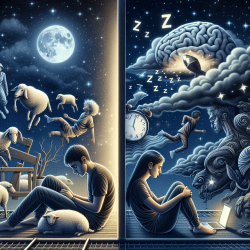Understanding the Link Between Sleep Deprivation and Depression in Adolescents
As practitioners dedicated to the well-being of children and adolescents, it's crucial to stay informed about the latest research findings that can impact our practice. A recent study titled Chronic Sleep Deprivation and Gender-Specific Risk of Depression in Adolescents: A Prospective Population-Based Study provides valuable insights into how sleep deprivation can differentially affect young men and women.
Key Findings from the Study
This longitudinal study, conducted with a cohort of 3,071 adolescents in British Columbia, explored the relationship between sleep deprivation and depression. The findings revealed a significant association between chronic sleep deprivation and increased depression scores in young women, while no consistent pattern was observed in young men. Specifically, young women who experienced chronic sleep deprivation had higher depression scores at follow-up compared to those who did not report sleep deprivation.
Implications for Practitioners
These findings underscore the importance of addressing sleep issues as part of mental health interventions for adolescents, particularly for young women. Here are some actionable steps practitioners can take:
- Screen for Sleep Patterns: Incorporate questions about sleep habits into routine assessments to identify adolescents at risk of sleep deprivation.
- Educate on Sleep Hygiene: Provide guidance on maintaining regular sleep schedules, creating a conducive sleep environment, and limiting screen time before bed.
- Gender-Sensitive Approaches: Recognize the gender-specific impact of sleep deprivation and tailor interventions accordingly. Young women may benefit from targeted strategies to improve sleep quality.
- Collaborate with Schools: Advocate for later school start times and educate school staff on the importance of adequate sleep for mental health.
Encouraging Further Research
While this study provides valuable insights, it also highlights the need for further research. Understanding the mechanisms underlying the gender-specific effects of sleep deprivation on depression can inform more effective interventions. Practitioners are encouraged to stay engaged with ongoing research and consider participating in studies that explore these dynamics.
Conclusion
The relationship between sleep deprivation and depression in adolescents is complex and influenced by gender. By incorporating these findings into practice, practitioners can better support the mental health of young people. Addressing sleep issues is not just about improving rest; it's a critical component of preventing and managing depression.
To read the original research paper, please follow this link: Chronic sleep deprivation and gender-specific risk of depression in adolescents: a prospective population-based study.










